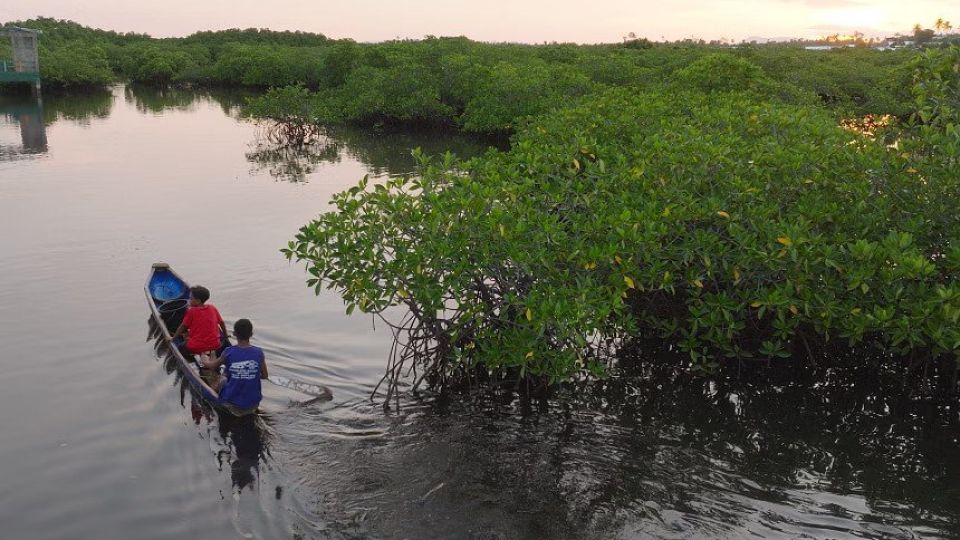November 7, 2023
SINGAPORE – Ms Rocky Tirona was one of the Philippines’ top creative directors when she decided it was time to shift gears.
That decision came after one particularly long, tedious meeting about dandruff. She did not want to spend the rest of her life thinking about things like men’s hygiene.
She longed to go back to where she thought her spirit had always been – the sea.
Ms Tirona has always had a connection to the sea, particularly the waters that hug the coasts. So, she marched up to her boss’ office one day and told him she wanted to sink her teeth into work that held more meaning.
“I think I made the jump at the right time… I’ve always loved the ocean, and I always wanted to use my skills to do more meaningful things,” she said.
Ms Tirona has since found her calling running the Fish Forever coastal fisheries programme of conservation and development organisation Rare.
One of her flagship initiatives, the Coastal 500 network, is among the 15 finalists chosen from some 1,500 nominees for The Earthshot Prize 2023, set to be awarded in Singapore on Tuesday, the only nominee from South-east Asia.
Coastal 500 is about saving the world’s coastal waters from man-made and climate-related disasters like overfishing and coral bleaching, Ms Tirona told The Straits Times.
“We work primarily on coastal waters, roughly 18km from the shore. So it’s that thin strip of ocean. It’s just 6 per cent of the ocean, but it’s actually where 70 per cent of marine biodiversity is found,” she said.
These are waters “that get really overrun by overfishing, destructive fishing practices”, she added.
Ms Tirona said fishermen have, in recent years, been catching less than a kilogram of fish per day, down from 8kg in the 1950s.
The fish are also getting smaller.
“It’s very hard to find lapu-lapu (grouper) any more that’s grown out or not supported by semi-farming practices,” she said.
Even pelagic species, which typically live in the open sea, like scads and sardines are being overfished when they come to coastal waters.
“I wouldn’t say they are at risk of extinction, but they are severely depleted,” said Ms Tirona.
There are just too many players competing for scarce resources.
Fishermen in coastal towns are competing against industrial fishers and among themselves.
That compels them to resort to destructive practices, such as dynamite and cyanide fishing, as well as using nets that can also catch juvenile fish and scrape the seabed
“They get more desperate and act more irresponsibly,” said Ms Tirona.
Mayors are the answer
For solutions, Coastal 500 is turning to mayors of coastal towns. It currently has more than 160 mayors in eight developing countries working with it.
Ms Tirona acknowledges that mayors, as politicians, have a transactional approach to their affairs, and that protecting marine life and fighting climate change may not usually be at the top of their agendas because these issues do not come with pivotal votes.
But they are the ones with the power and authority to do the most good, she said.
They can designate parts of coastal waters as marine sanctuaries, craft policies, and allocate funds and manpower to enforce the law. When they band together, they can even get central governments to approve laws and policies that have a wider impact.
Ms Tirona said protecting just 20 per cent of a critically depleted coast – specifically areas where fish spawn – is enough for fish stocks to recover.
One of Coastal 500’s success stories has been in Libertad town, a mostly fishing community in Antique province in the central Philippines.
Mayor Mary Jean Te realised early on that the marine life in her town’s coastal waters would be decimated unless she could convince her constituents to fish less.
That seemed counter-intuitive, and her efforts to designate protected areas unexpectedly met stiff resistance.
But she just kept talking to the fishermen about sustainable fishing practices while enforcing her rules, sternly but not harshly, usually by giving rule-breakers stern warnings or, if they persisted, light penalties like confiscating their gear for a day or two.
“When the fish started coming back, (the fishermen) started to see that their mayor was right, and they started asking her what else they could do right,” said Ms Tirona.
“Coastal 500 is really about connecting these leaders across the world because they share the same kinds of challenges and solutions, and then, in connecting them, hopefully inspire more action.”


